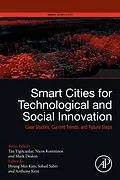Smart Cities for Technological and Social Innovation establishes a key theoretical framework to understand the implementation and development of smart cities as innovation drivers, in terms of lasting impacts on productivity, livability and sustainability of specific initiatives. This framework is based on empirical analysis of 12 case studies, including pioneer projects from Europe, Asia, the Middle East, and more. It explores how successful smart cities initiatives nurture both technological and social innovation using a combination of regulatory governance and private agency. Typologies of smart city-making approaches are explored in depth. Integrative analysis identifies key success factors in establishing innovation relating to the effectiveness of social systems, institutional thickness, governance, the role of human capital, and streamlining funding of urban development projects. - Cases from a range of geographies, scales, social and economic contexts - Explores how smart cities can promote technological and social innovation in terms of direct impacts on livability, productivity and sustainability - Establishes an integrative framework based on empirical evidence to develop more innovative smart city initiatives - Investigates the role of governments in coordinating, fostering and guiding innovations resulting from smart city developments - Interrogates the policies and governance structures which have been effective in supporting the development and deployment of smart cities
Klappentext
Smart Cities for Technological and Social Innovation establishes a key theoretical framework to understand the implementation and development of smart cities as innovation drivers, in terms of lasting impacts on productivity, livability and sustainability of specific initiatives. This framework is based on empirical analysis of 12 case studies, including pioneer projects from Europe, Asia, the Middle East, and more. It explores how successful smart cities initiatives nurture both technological and social innovation using a combination of regulatory governance and private agency. Typologies of smart city-making approaches are explored in depth. Integrative analysis identifies key success factors in establishing innovation relating to the effectiveness of social systems, institutional thickness, governance, the role of human capital, and streamlining funding of urban development projects.
- Cases from a range of geographies, scales, social and economic contexts
- Explores how smart cities can promote technological and social innovation in terms of direct impacts on livability, productivity and sustainability
- Establishes an integrative framework based on empirical evidence to develop more innovative smart city initiatives
- Investigates the role of governments in coordinating, fostering and guiding innovations resulting from smart city developments
- Interrogates the policies and governance structures which have been effective in supporting the development and deployment of smart cities
Inhalt
1. Introduction: being smarter for productivity, livability and sustainability 2. Fundamentals of smart cities: Governance, innovations and cities 3. Smart city in Singapore: How Environmental and Geospatial Innovation lead to urban livability and environmental sustainability cities 5. Japanese Smart Cities 6. 'Being First Comes Naturally': The Smart City and Progressive Urbanism in Australia 7. Understanding the Stakeholders' Perceptions in Smart Cities: The Experience of Using Q Methodology for Smart Gusu Project, China 8. Stimulating Innovation for Smart Cities in Hong Kong 9. Urban form, the use of ICT and informal smart cities in Vietnam 10. Smart urban development strategies in Africa? An analysis of multiple rationalities for Accra's City Extension Project 11. Smart Dubai IoT Strategy: Aspiration to promoting happiness for residents and visitors through a continuous commitment to innovation 12. Governing security by coding: a case of "smartness" in the Chilean context 13. Smart City Technologies in the USA: Smart Grid and Transportation Initiatives in Columbus, Ohio 14. Building the Future City of Glasgow: An evolutionary perspective 15. Autonomous Vehicles and Smart Cities: Where We Are 16. Evaluating recent trends: Diversified development paths of smart cities 17. Conclusion: steps for future smart cities
